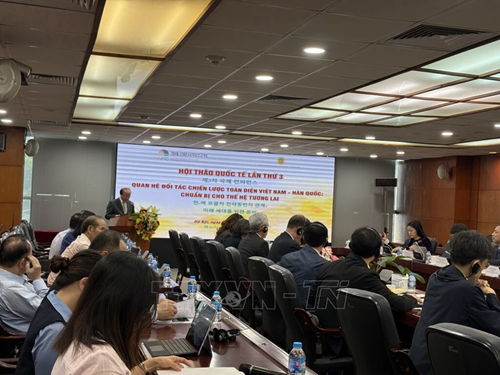Domestic and foreign experts and scientists looked into development strategies for younger generations at panel discussions on future education, future government, and the youth, employment and startup.
    |
 |
|
President of the Vietnam Academy of Social Sciences Dr. Phan Chi Hieu speaks at the workshop in Hanoi on November 7. |
In his remarks, VASS President Dr. Phan Chi Hieu highlighted several key achievements of bilateral relations, including in politics, security - defense, economy and investment, culture, education, science - technology, labor, and tourism.
He perceived that the two countries should enhance cooperation to cope with socio-economic challenges such as energy crisis, supply chain disruptions, and climate change.
Dr. Shin Dong-cheou said the two countries are promoting the research and development of artificial intelligence (AI), which is forecast to make big changes in various areas and improve labor productivity. Given this, they should encourage enterprises to develop technology and train specialized personnel to tap into the potential of AI and narrow the digital gap.
Assoc. Prof., Dr. Nguyen Thu Nghia from the VASS’s Graduate Academy of Social Sciences said digital transformation brings about both opportunities and challenges. In education - training cooperation, Vietnam and the RoK should work to further promote the education of new skills like digital skills and creativity.
At the workshop, participants also discussed the building of a policy researcher community, the expansion of collaboration between universities and research institutes of the countries, and the enhancement of research cooperation between the VASS and Korean partners.
The same day, the VASS signed a cooperation agreement with the RoK’s National Research Council for Economics, Humanities, and Social Sciences so as to strengthen research cooperation, boost academic exchanges, and share knowledge and experience in the fields of economics, humanities, and social sciences.
Source: VNA